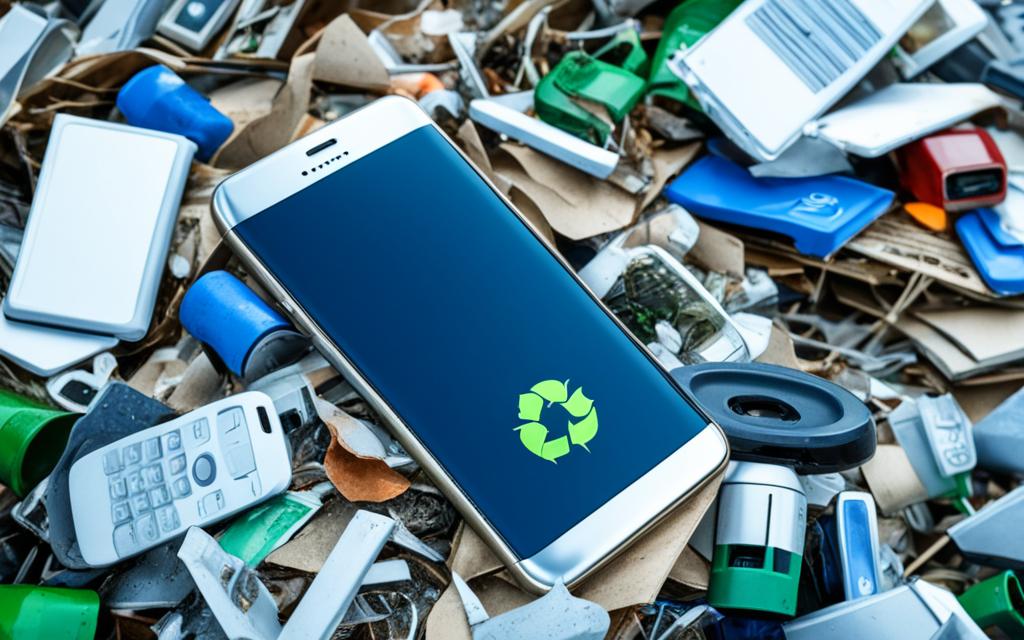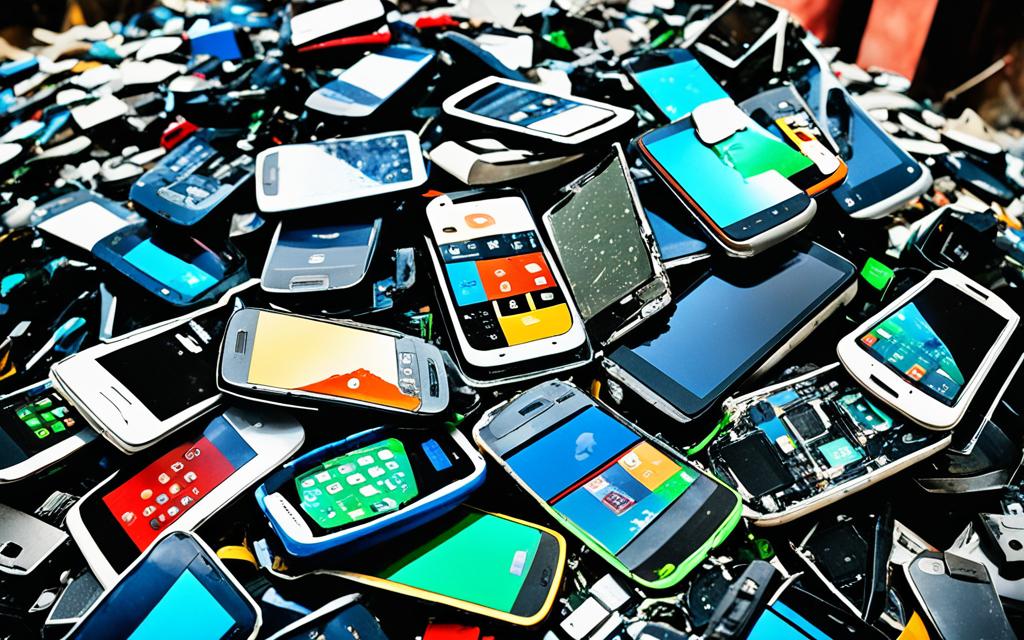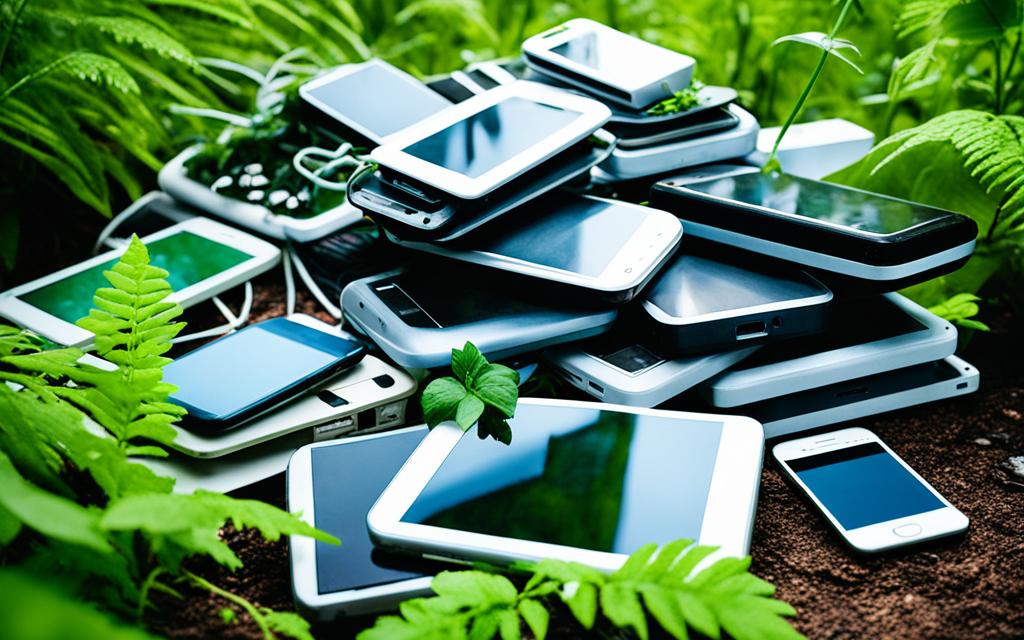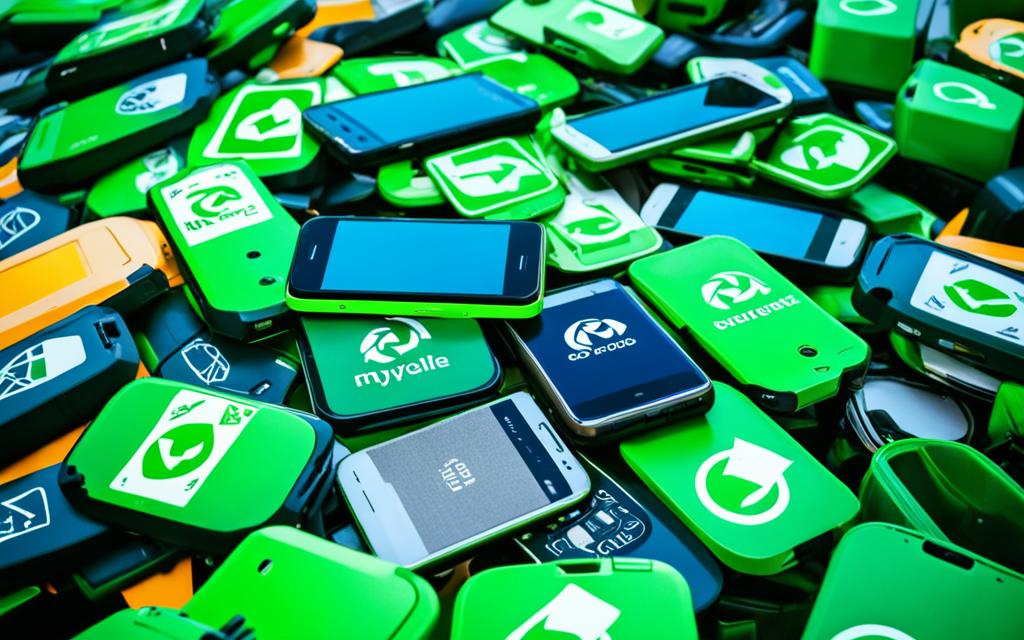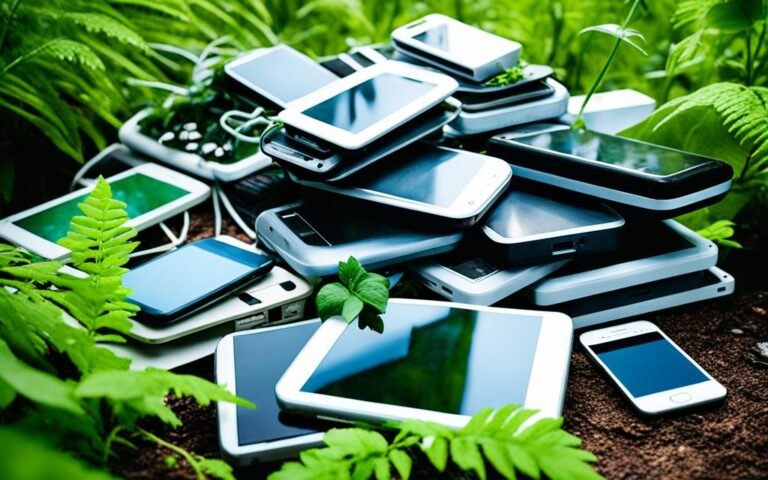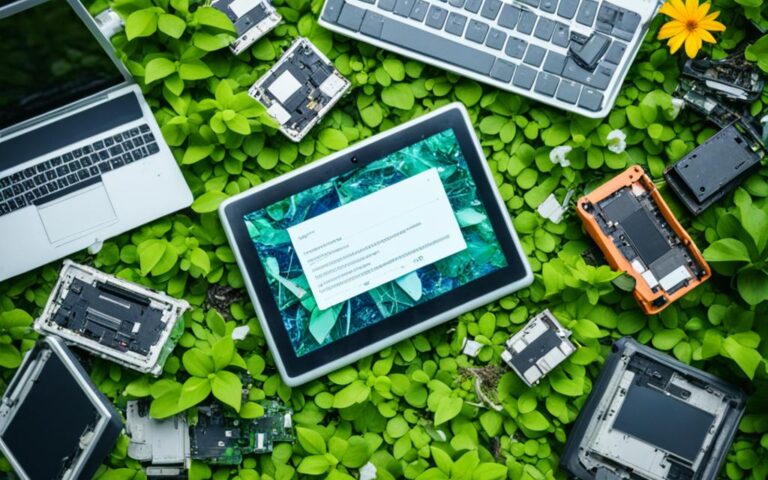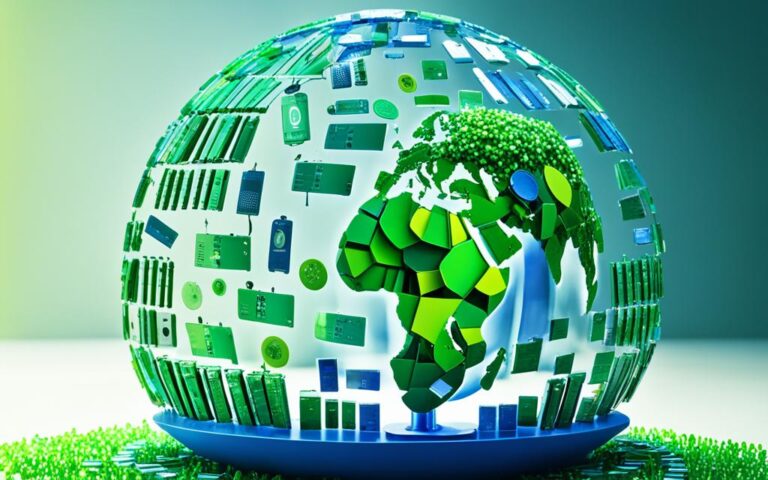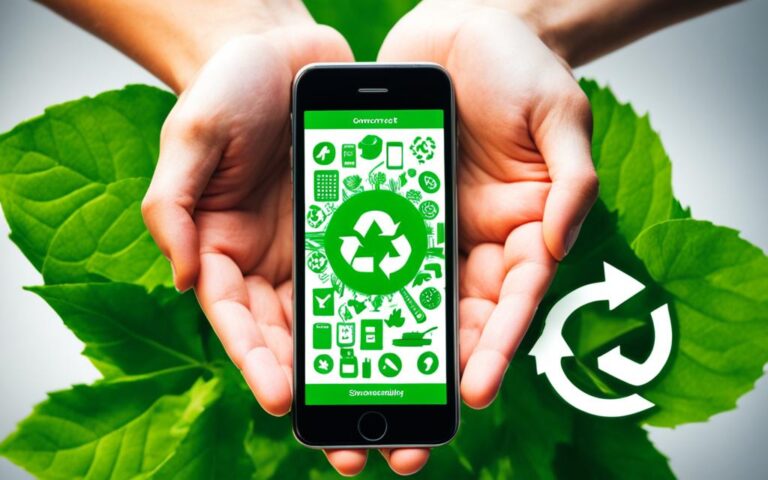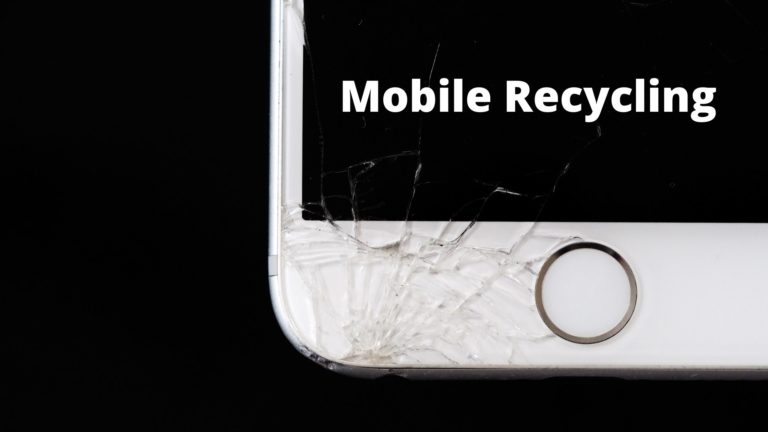Debunking Recycling Myths: The Truth About Phones and Tablets
Are you curious about the truth behind recycling myths? In today’s digital age, where phones and tablets are an integral part of our lives, e-waste recycling has become more important than ever. Let’s uncover the reality behind these recycling misconceptions and explore the impact that recycling old electronics can have on our environment.
There are many misconceptions surrounding e-waste recycling, but the truth is that not all e-waste is created equal. While electronic devices do contain valuable materials, hazardous components can make proper recycling challenging. However, recycling can prevent these materials from ending up in landfills and ensure they are put to good use.
E-waste recycling is not limited to large electronics or developed countries. Even small electronics like phones and tablets can be recycled. By recycling our old devices, we can reduce the demand for raw materials and protect our environment from the harmful effects of e-waste.
Join us as we dismantle these recycling myths and shed light on the importance of responsible e-waste recycling. Let’s work together to create a greener future for generations to come.
E-Waste Recycling: Myth vs. Fact
In the world of e-waste recycling, there are several myths and misconceptions that need to be debunked. It’s time to separate fact from fiction and gain a clearer understanding of the truth behind e-waste recycling.
Myth: All e-waste is recyclable.
Fact: While e-waste does contain valuable materials, not all e-waste is recyclable. Some electronic devices contain hazardous components, such as lead or mercury, making them unsuitable for traditional recycling methods. It’s crucial to handle and dispose of hazardous e-waste through special recycling programs to prevent environmental pollution.
Myth: E-waste recycling is expensive.
Fact: Contrary to popular belief, e-waste recycling is actually cost-effective. Recycling helps recover valuable materials, including precious metals like gold and silver, which can be reused in the manufacturing of new products. By recycling e-waste, we reduce the need for raw materials, ultimately lowering the overall cost of production.
Myth: E-waste recycling is only for large electronics.
Fact: E-waste recycling is not limited to bulky electronics alone. Small electronics like phones, tablets, and even accessories such as chargers and cables can be recycled. These devices often contain valuable materials that can be recovered and reused in the production of new electronic goods.
Myth: E-waste recycling is only for developed countries.
Fact: E-waste recycling programs are not exclusive to developed countries. Developing nations also recognize the importance of responsible e-waste management and have established their own recycling initiatives. Addressing e-waste is a global concern that requires international cooperation and participation.
Myth: E-waste recycling is not necessary.
Fact: E-waste recycling is crucial for environmental sustainability. When electronic devices are improperly disposed of or end up in landfills, their hazardous components can contaminate the soil and water, posing significant risks to both human health and the environment. By recycling e-waste, we minimize these risks and reduce the demand for virgin resources.
Myth: E-waste recycling is a government responsibility.
Fact: Responsibility for e-waste recycling extends beyond the government. While governments play a vital role in implementing regulations and establishing recycling infrastructure, individuals and businesses also have a shared responsibility in responsibly managing e-waste. By actively participating in recycling programs and choosing reputable recycling providers, we can all contribute to a sustainable future.
Myth: E-waste recycling is a one-time solution.
Fact: E-waste recycling is an ongoing process. As technology advances and electronic devices become more prevalent in our lives, the amount of e-waste generated continues to grow. To effectively address this issue, we need to embrace recycling as a continuous practice, encouraging responsible disposal and recycling of electronic devices whenever they reach the end of their useful lives.
Let’s debunk the myths and embrace the facts. E-waste recycling is not only essential for the health of our planet but also for conserving valuable resources and creating a more sustainable future. By understanding the truth behind e-waste recycling, we can all make informed decisions and take action to protect our environment.
The Environmental Impact of E-Waste
E-waste, or electronic waste, has a substantial impact on the environment when not properly recycled. This form of waste includes discarded electronic devices that have reached the end of their useful lives. When these devices are disposed of in landfills, they take up valuable space and contribute to pollution.
One of the most significant environmental concerns surrounding e-waste is the release of hazardous materials into the soil and water. Many electronic devices contain toxic substances such as lead, mercury, cadmium, and flame retardants. Improper disposal of e-waste allows these harmful substances to seep into the environment, posing risks to both human health and the ecosystem.
However, responsible e-waste recycling is an effective solution to mitigate these environmental impacts. By recycling electronic devices, valuable materials can be extracted and reused, reducing the need for raw materials extraction. This, in turn, helps to conserve natural resources, prevent deforestation, and minimize other environmental problems associated with resource extraction.
Proper e-waste recycling also plays a vital role in reducing energy consumption and greenhouse gas emissions. Recycling electronic devices requires less energy compared to manufacturing new products from scratch. It is estimated that recycling one million laptops saves the energy equivalent of powering over 3,500 U.S. homes for a year.
Furthermore, e-waste recycling helps to create a more circular economy by reusing valuable materials instead of discarding them. By adopting sustainable practices and recycling electronic waste, we can significantly reduce the environmental burden and contribute to a more sustainable future.
| Environmental Impact | Benefits of E-Waste Recycling |
|---|---|
| Pollution of soil and water due to hazardous materials | Reduces the need for raw material extraction |
| Contributes to deforestation and other environmental problems | Conserves natural resources |
| Increases energy consumption and greenhouse gas emissions | Reduces energy consumption and greenhouse gas emissions |
| Waste accumulation in landfills | Promotes a circular economy by reusing valuable materials |
It is essential for individuals, businesses, and governments to prioritize proper e-waste recycling to minimize environmental harm and maximize the benefits associated with recycling.
Common Recycling Misconceptions
Although electronics recycling is essential for a sustainable future, there are several common myths that hinder its practice. By debunking these misconceptions, we can encourage responsible electronics recycling and mitigate the environmental impact of e-waste.
- Myth: Small electronics like cables won’t cause harm in landfills.
- Myth: Storing outdated technology at home is a safe alternative to recycling.
- Myth: Data security concerns make recycling unsafe.
- Myth: A significant amount of e-waste is exported instead of being properly recycled.
To address these misconceptions:
“Every electronic device, no matter how small, contains valuable materials that can be reclaimed through recycling. Cables, for example, may seem insignificant, but they contribute to the growing pile of electronic waste in landfills. By recycling these small items, we can recover valuable resources and reduce the environmental impact.”
Storing outdated technology at home rather than recycling it is a common misconception. However, this approach only leads to clutter and prevents valuable materials from being recovered and reused. Responsible recycling is the key to curbing e-waste accumulation.
It is also essential to debunk the myth that recycling poses data security risks. Reputable electronics recycling providers follow strict protocols to ensure data destruction, protecting your personal information and giving you peace of mind.
Another prevalent misconception is that a large portion of e-waste is exported instead of being properly recycled. However, responsible recycling practices aim to process e-waste locally, minimizing the negative environmental impact and maximizing resource recovery.
By challenging these misconceptions and promoting responsible electronics recycling, we can take significant steps towards a greener future.
The Importance of Responsible Electronics Recycling
Responsible electronics recycling is crucial for ensuring a sustainable future and mitigating the environmental impact of e-waste. By participating in responsible recycling practices, individuals and businesses contribute to the preservation of our planet and the conservation of valuable resources.
E-waste contains hazardous materials that, if not properly recycled, can lead to environmental contamination. Responsible electronics recycling helps prevent these materials from ending up in landfills or being released into the soil and water, protecting both human health and the ecosystem.
Furthermore, sustainable recycling practices reduce the demand for raw materials, such as metals and rare earth elements, which are often extracted through environmentally destructive processes like mining. By recycling electronics, we can minimize the need for these resources and help combat issues like deforestation and habitat destruction.
One key aspect of responsible electronics recycling is ethical processing and resource recovery. Recycling facilities that adhere to ethical practices ensure that e-waste is handled properly, with hazardous materials disposed of safely and valuable resources extracted for reuse. This not only minimizes waste but also maximizes the potential for resource conservation and circular economy principles.
By emphasizing responsible electronics recycling, we empower individuals and businesses to make a positive impact on the environment. Each device recycled represents a step toward a more sustainable future, where the consumption and disposal of electronics are done with mindfulness and consideration for the planet.
Together, let’s embrace responsible electronics recycling and pave the way towards a greener and more sustainable tomorrow.
| Benefits of Responsible Electronics Recycling | Impact |
|---|---|
| Prevents environmental contamination | Reduces the release of hazardous materials into the environment |
| Conserves valuable resources | Reduces the demand for raw materials, such as metals and rare earth elements |
| Minimizes waste | Ensures proper handling and disposal of e-waste |
| Supports the circular economy | Maximizes resource recovery and reuse |
| Protects human health | Prevents exposure to toxic substances |
Conclusion
Recycling old electronics is an essential step in reducing the environmental impact of e-waste. As technology continues to advance at a rapid pace, it is important to responsibly recycle our outdated devices. By doing so, we not only contribute to a greener future but also ensure the recovery of valuable resources.
While there may be myths and misconceptions surrounding electronics recycling, it is clear that responsible recycling is necessary and beneficial. To ensure the security of your data and the ethical handling of electronic waste, it is crucial to partner with a reputable recycling provider.
By recycling old electronics, we can effectively reduce the amount of e-waste that ends up in landfills, preventing environmental contamination and conserving valuable resources. Don’t let your outdated electronics sit unused or end up in the wrong hands. Take action today and recycle responsibly for a more sustainable future.
FAQ
Is all e-waste recyclable?
While e-waste contains valuable materials, not all e-waste is recyclable due to hazardous components.
Is e-waste recycling expensive?
No, e-waste recycling is cost-effective as it extracts valuable materials and reduces the cost of manufacturing new products.
Is e-waste recycling only for large electronics?
No, e-waste recycling includes small electronics like phones and tablets.
Is e-waste recycling only for developed countries?
No, developing countries also have e-waste recycling programs.
Is e-waste recycling necessary?
Yes, e-waste recycling is necessary to avoid environmental contamination and reduce the need for raw materials.
Is e-waste recycling solely the government’s responsibility?
No, e-waste recycling is a shared responsibility between governments, individuals, and businesses.
Is e-waste recycling a one-time solution?
No, e-waste recycling is an ongoing process as e-waste is constantly generated.

